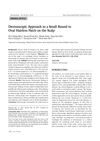Non-Invasive Approaches for the Diagnosis of Autoimmune/Autoinflammatory Skin Diseases: A Focus on Psoriasis and Lupus Erythematosus
August 2019
in “
Frontiers in Immunology
”

TLDR Non-invasive methods show promise for diagnosing skin diseases like psoriasis and lupus but need more research for regular use.
The document from August 2019 reviews non-invasive diagnostic methods for autoimmune/autoinflammatory skin diseases, particularly psoriasis and lupus erythematosus. It discusses the use of non-invasive sampling techniques like plucked hair and skin tape-strips, which can provide molecular insights and improve diagnosis and treatment strategies. Imaging techniques such as dermatoscopy, RSOM, OCT, and LDI, along with functional skin testing methods like TEWL and skin elasticity measurement, are also covered. The review notes the potential of these techniques to become advanced diagnostics and their role in understanding inflammatory skin diseases. However, it acknowledges challenges such as standardization and variability in sample quality, particularly with tape stripping. The document also mentions the identification of proteins involved in disease pathomechanisms and the correlation of NGF levels with disease and itch severity. It concludes that while non-invasive approaches hold promise for aiding treatment decisions and monitoring disease progression, further research and larger trials are needed to establish robust biomarker algorithms for routine care.











